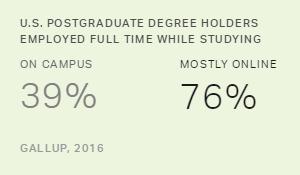Postgraduate degree holders in the U.S. who took at least half of their graduate classes online earned their degrees under different circumstances than did those who took most of their courses on campus. And their experiences as graduate students were different. However, a new Gallup study shows those who complete at least half of their coursework online are faring just as well (and in some cases, better) in their careers and lives.
Earlier this year, Gallup completed its first representative study of postgraduate degree holders in the U.S. As a subset of the overall study, it included those who took at least half of their postgraduate coursework online. All participants received their degrees between 1990 and 2015*, and most are in their prime earning years, offering insight into how postgraduate education affects many Americans' lives and career paths.
The study found differences between the life situations of postgraduates who took the bulk of their work online and those of postgraduates who did not. Postgraduate degree holders in the U.S. who took at least half of their graduate courses online are about twice as likely as those who took their courses mostly on campus to have been employed full time for an employer at the time (76% vs. 39%) and to have had children 17 or younger living in their households (51% vs. 25%).
Most people won't be surprised to learn that those who took at least half of their graduate courses online are less likely to have experienced three important "emotional support" elements of the college experience that the Gallup-Purdue Index measures. They are less likely to strongly agree that their professors cared about them as a person (22% online vs. 31% mostly on campus), that they had a mentor who encouraged their goals and dreams (16% vs. 30%) and that they had a professor who made them excited about learning (44% vs. 65%). However, graduate degree holders who took the bulk of their classes online are just as likely as their peers to strongly agree their school was "the perfect school for people like me" (36% vs. 30%).
The most interesting and important findings, however, are in their career outcomes. Postgraduate degree holders who took the bulk of their classes online are just as likely as their peers who took most courses on campus to be currently employed full time (79% vs. 78%), to hold professional and managerial jobs (85% vs. 88%) and to strongly agree they are "deeply interested in the work [they] do" (52% vs. 48%). And, among those promoted at work, they are similarly likely to say their degree was "very important" for getting promoted at work (55% vs. 48%).
When it comes to overall satisfaction with their personal lives, it's a statistical tie between postgraduate degree holders who took at least half of their classes online and postgraduate degree holders who did not (86% vs. 89%). At a time when Americans say the most important reason for pursuing college is "to get a good job," it's clear from these career outcome measures that postgraduate degrees are an effective pathway to this goal.
Most postgraduate degree programs with online components have been specifically designed for working adults and those with children. They provide pathways to higher education for those who wouldn't otherwise have them. Just like classroom-based university pathways and degrees, there is plenty of room for improving postgraduate programs with online components. But overall, these degree holders fare at least as well as their traditional degree counterparts.
The needs and experiences of the average postgraduate degree holder who takes classes online are largely different from those of their peers -- and institutions seeking to serve them must take note of this. A recent Gallup study of Walden University alumni shows that institutions must focus on helping working adults complete their postgraduate education without leaving their current jobs, providing them with regular and relevant applications of their learning and work, and even building interactions (online) with other students worldwide.
Postgraduate programs with online offerings are working well for the unique population of students they were designed to serve. It's officially time to stop judging postgraduate degrees by their online status.
*Graduates who took the majority of their courses online had a median graduation year of 2011 in this study; graduates who took the majority of their courses in person had a median graduation year of 2005. Further analysis is required to explore whether differences between the mostly online and mostly in-person groups may be partly attributable to overall changes in higher education and society in general that have taken place since the rise in availability and popularity of online education.


